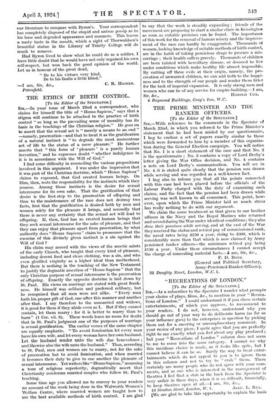THE ETHICS OF BIRTH CONTROL.
[To the Editor of the SPECTATOR.] SIR,ŌĆöIn your issue of March 22nd a correspondent, who claims for himself the title of " Homo Sapiens," says that a stigma will continue to be attached to the practice of birth control " so long as the prevailing sense of morality has its basis in the teachings of the Christian religion." He goes on to assert that the sexual act is " merely a means to an end " ŌĆönamely, procreationŌĆöand that to treat it as the gratification of a natural instinct is " to degrade the most momentous act of life to the status of a mere pleasure." He further asserts that " this form of ' pleasure ' is a purely human invention," and he expresses doubt " whether indulgence in it is in accordance with the Will of God."
I find some difficulty in reconciling the various propositions involved in this argument. I was under the impression that it was part of the Christian doctrine, which " Homo Sapiens" claims to expound, that God created human beings. On Him, then, rests the responsibility for the instincts which they possess. Among those instincts is the desire for sexual intercourse for its own sake. That the gratification of that desire is the first step to the procreation of offspring and thus to the maintenance of the race does not destroy two facts, first that the gratification is desired both by men and women solely for the pleasure it brings, and secondly that there is never any certainty that the sexual act will lead to offspring. If, then, God has so created human beings that they seek sexual intercourse for the sake of pleasure, and that they can enjoy that pleasure apart from procreation, by what authority does "Homo Sapiens" claim to pronounce that the exercise of this divinely given instinct is a sin against the Will of God ?
His claim may accord with the views of the ascetic saints of the early Church, who taught that every kind of pleasure, including decent food and clean clothing, was a sin, and who even glorified virginity as a higher ideal than motherhood. But there is nothing in the teaching of the New Testament to justify the dogmatic assertion of "Homo Sapiens" that the only Christian purpose of sexual intercourse is the procreation of offspring. Exactly the opposite doctrine is laid down by St. Paul. His views on marriage are stated with great frank- ness. He himself was celibate and preferred celibacy, but he recognized that all men were not alike. " Every man hath his proper gift of God, one-after-this manner and another after that. I say therefore to the unmarried and widows, it is good for them if they abide even as I. But if they cannot contain, let them marry : for it is better to marry than to burn" (1 Cor. vii. 9). These -words leave no room for doubt that in St. Paul's judgment one of the purposes of marriage is sexual gratification. The earlier verses of the same chapter are equally emphatic. " To avoid fornication let every man have his own wife, and let every woman have her own husband. Let the husband render unto- the wife due benevolence ; and likewise also the wife unto the husband." Thus, according to St. Paul, men and women are to marry, not for the sake of procreation but to avoid fornication, and when married it becomes their duty to give to one another the pleasure of sexual intercourse. Yet writers like "Homo Sapiens," assuming a tone of religious superiority, dogmatically assert that Christianity condemns married couples who follow St. Paul's teaching.
Some time ago you allowed me to convey to your readers an account of the work being done in the Walworth Women's Welfare Centre, where married women are taught how to use the best available methods of birth control. I am glad
to say that the work is steadily expanding ; friends of the movement are proposing to start a similar clinic in Kensington as soon as suitable premises can be found. The importance of this work for the removal of human misery and the improve- ment of the race can hardly be exaggerated. Thousands of women, lacking knowledge of suitable methods of birth control, are in the habit of taking pernicious drugs to procure a mis- carriage ; their health suffers gravely. Thousands of children are born tainted with hereditary disease, or doomed to live under conditions which make healthy life almost impossible. By cutting off these evils at their origin, namely, the pro- creation of unwanted children, we can add both to the happi- ness and to the strength of our people and render them fitter for the task of imperial expansion. It is only strong men and women who can be of any service for empire-building.ŌĆöI


























































 Previous page
Previous page